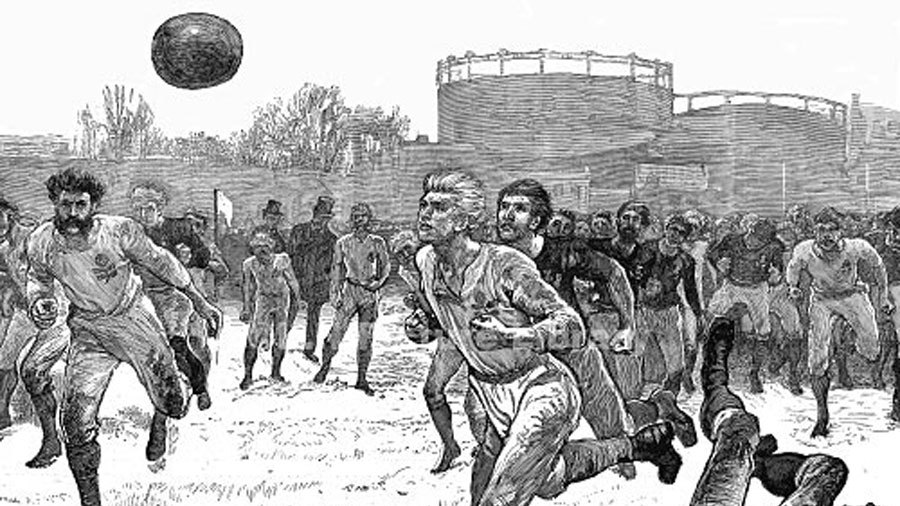February 5 down the years
Violence and pitch invasions blight Scotland win
A contemporary drawing of the first rugby international in England on this day in 1872 © Scrum.com
1921
"Uproar" claimed the Daily Mail after the match between Wales and Scotland at Swansea was disrupted several times when spectators spilled onto the pitch as a a result of far too many being admitted to the ground. In the worst incident the players were led from the pitch as mounted police tried to restore order, only for them to be pelted with "lumps of breeze and gravel". There were a handful of injuries in the melee, one serious after being struck on the head. The game resumed against a backdrop of continuing unrest only for the referee to stop the game again a few minutes later and again take the players off. The drama did not end there. When play again restarted a temporary stand collapsed and three people were taken to hospital. The press also suffered. When the crowd in front of them pitch-side refused to sit down, they in turn had to stand up to follow play, only to be pelted with gravel and orange peel. "Altogether, everybody spent a very jolly afternoon," sarcastically noted the Times. Scotland won 14-8, their first victory in Wales for 29 years, thanks to tries from John Buchanan, Allen Sloan and Alpin Thomson.
2000
When five became six, and the new boys delivered the best riposte to those arguing they had no right to dine at the top table. The first Six Nations Championship kicked off with newcomers Italy beating Scotland 34-20 in Rome's Stadio Flaminio. Fly-half Diego Dominguez contributed 29 of the winners' points against the reigning champions, with replacement prop Giampiero de Carli scoring their only try. Italy have only won five further games since their admission to the tournament, all against Scotland or Wales.
2005
A corner try by Shane Williams and a gigantic late penalty kicked by Gavin Henson brought Wales an 11-9 triumph over England - their first win against the old enemy for six years. In front of a big crowd at the Millennium Stadium Wales won a tense game, with Charlie Hodgson keeping England in touch with the boot. Henson's late kick was accompanied by two crunching hits on England debutant Mathew Tait and set Wales on their way to a first Grand Slam since 1978.
1872
The start of it all. England beat Scotland at Kennington Oval in the first international match to be staged on English soil. The Scots had won the previous fixture in Edinburgh a year earlier, the first Test match of all, although this time England won by two goals to one and also scored three tries.
1910
A severe cut sustained by Scotland outside-half Jim Tennent early in the match against Wales led to the IRB laying down strict safety regulations about the diameter and shape of boot studs.
1877
In the first international match between teams of 15-a-side England beat Ireland at The Oval. Teams of 20 had contested all previous internationals. Englans scored four tries and fullback Lennard Stokes knocked over two conversions for a two goals to nil victory.
1887
Ireland beat England for the first time thanks to three-quarter Daniel Rambaut's two conversions in a two goals to nil victory. Ireland's John Macauley got married to qualify for compassionate leave - the only way he can get time off to travel up to Dublin for the match. His wife fully endorsed his enthusiasm.
1938
Harry Rees, dazed by an accidental kick to the head, was penalised in the last minutes of the Scotland-Wales match at Murrayfield. Scotland's Wilf Crawford kicked the penalty to add to the try and conversion he had scored earlier to carry his side to an 8-6 win in a Triple Crown season.
1955
Scotland ended an unwanted run of 17 successive Test defeats (since 1951), beating Wales 14-8 at Murrayfield. Scrum-half James Nichol and wing Arthur Smith scored the Scottish tries.
1972
Gareth Edwards scored a try in the Cardiff slime at the south-east corner of the Arms Park with a memorable solo effort from his own 25 as Wales overwhelmed Scotland 35-12. Edwards' effort was one of two tries for the legendary scrum-half, with centre Roy Bergiers, wing Gerald Davies and flanker John Taylor completing the rout.
1983
British Telecom became the first company to sponsor a Five Nations match when Wales drew 13-13 with England at Cardiff.
© Scrum.com


